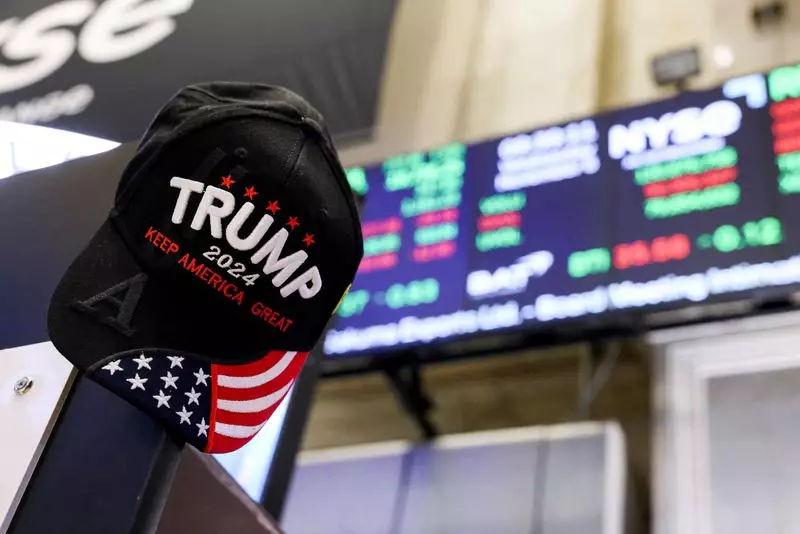The recent appointment of Scott Bessent as Treasury Secretary by President-elect Donald Trump has injected a renewed sense of optimism into the beleaguered U.S. government bond market. This decision comes at a time when investor unease loomed over the Treasury markets—a situation exacerbated by concerns about rising inflation and increasing federal budget deficits stemming from Trump’s proposed economic reforms. This article will explore the potential impacts of this nomination, the historical context of the bond market during political transitions, and what it might mean for future fiscal policies.
A Sense of Relief in a Volatile Market
The announcement of Bessent’s selection offers a welcome relief to investors who have been grappling with weeks of skepticism surrounding the Treasury role. Verdicts over his fiscal conservatism are generally favorable and suggest a potential stabilizing force that could alleviate fears of uncontrolled budgetary expansion and risky trade policies. According to Michael Purves, CEO of Tallbacken Capital Advisors, Bessent’s nomination is perceived as a significant factor in mitigating the anxiety surrounding Trump’s economic team. His relatively moderate economic views set a tone that could foster more confidence in the legions of investors anxious about potential shifts in fiscal strategy.
Through his experience in investment management, Bessent is expected to advocate for prudent economic management, attuned to the needs of the financial market. This is particularly crucial as the U.S. government grapples with increasing interest rates and a tumultuous financial landscape. As the benchmark U.S. 10-year yield climbs to its highest level in five months, investors are keenly watching to see how Bessent will maneuver the administration’s economy-focused agenda and whether he can effectively communicate a vision of fiscal responsibility.
The impacts of political transitions on the bond market cannot be underestimated. Historically, periods of uncertainty surrounding cabinet appointments have triggered volatility in Treasury yields. Financial markets respond favorably to candidates viewed as fiscally conservative or market-friendly, as they help to maintain stability amidst potentially destabilizing economic policies. Bessent’s reputation as a fiscal conservative will undoubtedly be scrutinized, as any departures from those principles could lead to greater volatility in bond prices.
As concerns regarding Trump’s proposed tariffs linger, the potential for a more aggressive trade policy could lead to heightened tensions in the financial markets. The climate of uncertainty is compounded by fears of isolationist policies that could exacerbate a global financial crisis. Economists warn that a Treasury Secretary aligned with anti-market rhetoric could further deepen investor apprehension, thus intensifying volatility in the U.S. economy.
In the realm of economic policymaking, Bessent’s thoughts on tax reform and deregulation are particularly crucial. His previous advocacy for policies designed to induce lending and spur energy production indicates a focus on growth-oriented strategies. This could be a double-edged sword; while many observers welcome moves to encourage economic activity, the implications of tax cuts and increased imports could heighten concerns about deficits and inflation.
Christopher Hodge, an economist at Natixis, remarked on the importance of Bessent’s market-savvy perspective, which may act as a buffer against the more extreme trade proposals that Trump has suggested. This is vital in a climate where fears of a tariff war escalate, as such measures could shift the landscape for corporate profits and, consequently, for bond yields. The direction of U.S.-China relations, specifically, remains a focal point that could significantly influence market sentiments.
Alongside fiscal responsibilities, Bessent will likely face pressures regarding the independence of the Federal Reserve. Trump has previously indicated that he believes the presidency should have a significant role in Federal Reserve decisions—a point that raises alarms about potential political interference in monetary policy. Observers stress the importance of maintaining the Fed’s independence, as this not only supports market stability but also fosters investor confidence across various sectors.
Ultimately, as Bessent steps into a role laden with complexity and expectation, how he chooses to balance fiscal responsibility with growth initiatives will be pivotal. Investors and market analysts will be monitoring his moves closely, navigating the delicate interplay between robust economic growth and prudent governance. The choices made in this cabinet position will reverberate across the markets, potentially influencing everything from bond yields to international trade relationships in the years to come.

